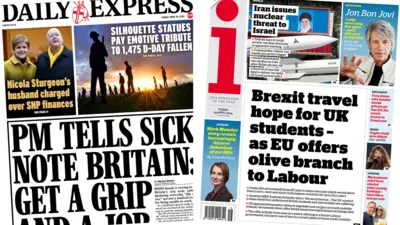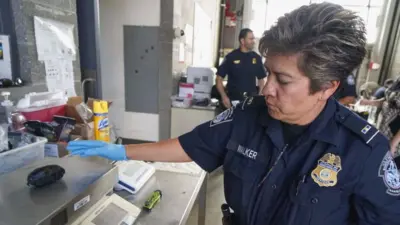We've updated our Privacy and Cookies Policy
We've made some important changes to our Privacy and Cookies Policy and we want you to know what this means for you and your data.
Julian Assange 'phoned White House to warn of risk to lives'
Image source, Julia Quenzler
Wikileaks co-founder Julian Assange tried to phone the White House to warn them unredacted files were about to be published online, a court has heard.
Mr Assange is fighting extradition to the US to face trial over the leaking of classified US military documents.
His lawyer dismissed claims he "knowingly" put lives at risk by publishing the names of informants.
He told Woolwich Crown Court that a book by the Guardian newspaper was to blame for the names being published.
Those suggestions have been rejected by the Guardian.
The claims came on the second day of the extradition hearing for Mr Assange, 48, who is accused of conspiring to hack into US military databases to acquire sensitive secret information, which was then published on the Wikileaks website.
Lawyers for Mr Assange claim the US charges are politically motivated.
Mark Summers QC, representing Mr Assange, told the hearing in London that Wikileaks had begun redacting a tranche of 250,000 leaked cables in November 2010, working with media partners around the world as well as the US government.
He said that in February 2011 the Guardian published a book about Wikileaks which contained a password to the unredacted documents.
He said it wasn't until months later that it was discovered the password could be used to access the unredacted database, which was revealed by German news outlet Der Freitag on 25 August 2011.
On that day, Mr Assange called the White House and asked to speak to then secretary of state Hillary Clinton "as a matter of urgency" over fears the documents were about to be dumped online by third parties who had gained access, Mr Summers told the court. He was told to ring back in a few hours.
Mr Summers said Mr Assange had warned: "I don't understand why you're not seeing the urgency of this.
"Unless we do something, then people's lives are put at risk."
'No concerns expressed'
Responding to the claims made in court, a Guardian spokesman said it was "entirely wrong" that its 2011 Wikileaks book led to the publication of unredacted files.
He said: "The book contained a password which the authors had been told by Julian Assange was temporary and would expire and be deleted in a matter of hours. The book also contained no details about the whereabouts of the files."
He added that "no concerns were expressed" by Mr Assange or Wikileaks about security being compromised when the book was published.
Image source, Getty Images
Prosecutors argued on Monday that Mr Assange knowingly put hundreds of sources around the world at risk of torture and death by publishing the unredacted documents containing names or other identifying details.
But Mr Summers told the court that the US extradition request "boldly and brazenly" misrepresented the facts.
He said the US government, which was involved in the redaction process, knows "what actually occurred" which was "far from being a reckless, unredacted release".
In response, James Lewis QC, representing the US government, told the court that Mr Assange "didn't have to publish the unredacted cables".
"He decided to do so on a widely followed and easily searchable website, knowing that it was dangerous to do so," he added.
Mr Assange has been held in Belmarsh prison since last September ahead of his extradition hearing.
He was originally jailed for 50 weeks in May 2019 for breaching his bail conditions after going into hiding in the Ecuadorian embassy in London for nearly seven years.
He sought asylum at the embassy to avoid extradition to Sweden on a rape allegation that he denied. That investigation was subsequently dropped.
The hearing continues on Wednesday.
Top Stories
Features & Analysis
Most read
Content is not available








